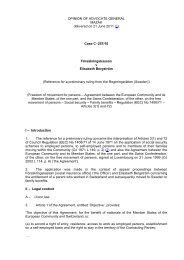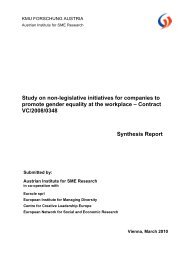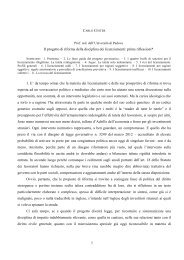Full text - European Trade Union Institute (ETUI)
Full text - European Trade Union Institute (ETUI)
Full text - European Trade Union Institute (ETUI)
Create successful ePaper yourself
Turn your PDF publications into a flip-book with our unique Google optimized e-Paper software.
Isabelle Schömann and Carolie Guedes<br />
the stubborn opposition of a minority of Member State governments prevented<br />
progress in this crucial area.<br />
In May 2004, ten more Member States joined the <strong>European</strong> <strong>Union</strong>; this major<br />
event in the construction of the EU certainly did not facilitate the task of<br />
the Council. One of the main stumbling blocks was once again the principle<br />
of equal treatment. Three derogations from the principle were proposed: the<br />
Nordic derogation, the German derogation and the British derogation, as they<br />
have been called (Vaes and Vandenbrande 2009).<br />
The first derogation consisted of a possibility for national social partners to<br />
derogate from the principle of equal treatment through collective bargaining.<br />
Nordic countries – and in particular Sweden and Denmark, where working<br />
conditions are mostly regulated by collective agreement – did not want their<br />
bargaining power reduced by the adoption of the Directive (Vaes and Vandenbrande<br />
2009). It is true that, from the point of view of countries that have<br />
a strong tradition of regulating employment through collective bargaining,<br />
this exception makes sense. But it contains a risk for countries in which trade<br />
unions’ or worker representatives’ bargaining power is weak.<br />
The so-called German derogation provided that, with regard to pay, Member<br />
States, after consulting the social partners, may allow exemptions from<br />
the principle of equal treatment for workers with a permanent contract of<br />
employment with a temporary work agency. Whether to include temporary<br />
agency workers with a permanent employment contract in the scope of the<br />
Directive or not had been a key issue during the bargaining process between<br />
the <strong>European</strong> social partners. The proposed derogation seemed to be a halfway<br />
solution.<br />
Finally, the British derogation provided the possibility of implementing a<br />
qualifying period. The risk contained in this derogation is that in most <strong>European</strong><br />
countries temporary agency work is essentially temporary and the duration<br />
of assignments is fairly short. Providing a long qualifying period would<br />
thus exclude most workers from the scope of the Directive.<br />
Despite the fact that a compromise seemed to have been reached on the principle<br />
of equal treatment (the principle itself and the comparable worker), a<br />
fundamental disagreement remained. Member States did not agree on the<br />
aim of the Directive: some wanted to put the emphasis on labour market flexibility,<br />
while others wanted to put it on the protection of temporary agency<br />
workers (Vaes and Vandenbrande 2009).<br />
In 2007, during the Portuguese Presidency, greater efforts were made to<br />
reach an agreement (Vaes and Vandenbrande 2009). Moreover, most Member<br />
States were actually in favour of the Presidency <strong>text</strong> and their number would<br />
probably achieve a qualified majority. Thus, the Employment, Social Policy,<br />
Health and Consumers Affairs Council was ready to put the matter to a vote,<br />
as unanimity was not required (EIRO, January 2008). Furthermore, on 28<br />
May 2008, the <strong>European</strong> social partners for the temporary agency work sec-<br />
16 Report 125
















